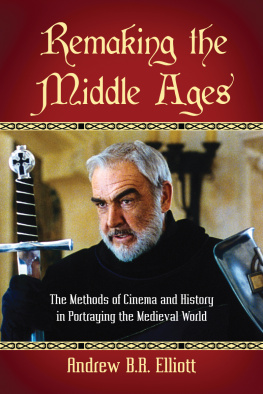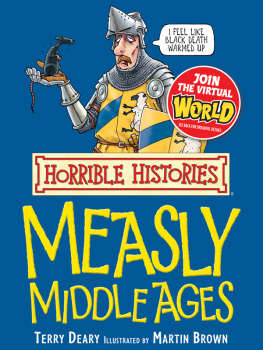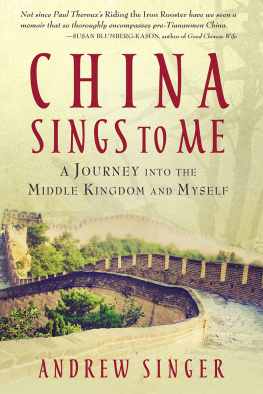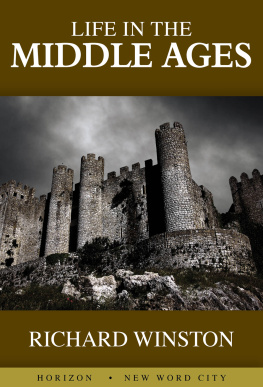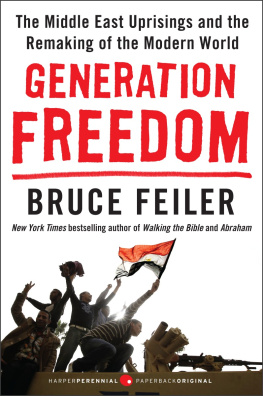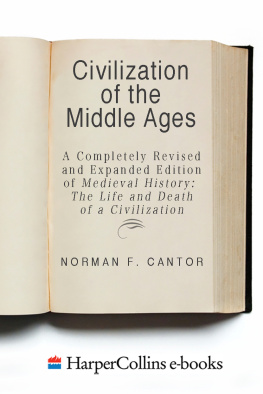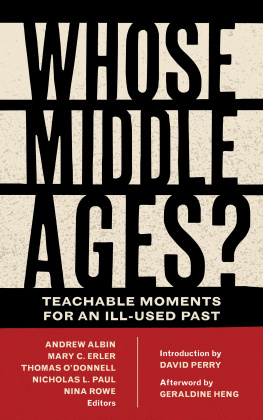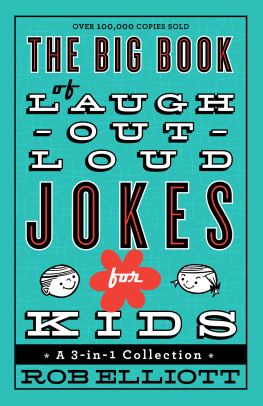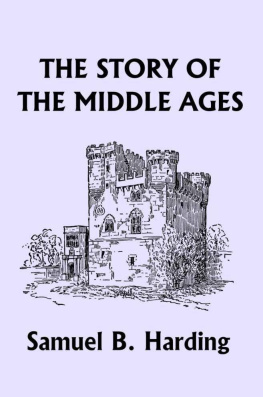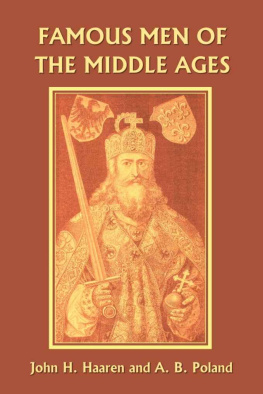Andrew B.R. Elliott - Remaking the Middle Ages
Here you can read online Andrew B.R. Elliott - Remaking the Middle Ages full text of the book (entire story) in english for free. Download pdf and epub, get meaning, cover and reviews about this ebook. genre: Religion. Description of the work, (preface) as well as reviews are available. Best literature library LitArk.com created for fans of good reading and offers a wide selection of genres:
Romance novel
Science fiction
Adventure
Detective
Science
History
Home and family
Prose
Art
Politics
Computer
Non-fiction
Religion
Business
Children
Humor
Choose a favorite category and find really read worthwhile books. Enjoy immersion in the world of imagination, feel the emotions of the characters or learn something new for yourself, make an fascinating discovery.
- Book:Remaking the Middle Ages
- Author:
- Genre:
- Rating:4 / 5
- Favourites:Add to favourites
- Your mark:
- 80
- 1
- 2
- 3
- 4
- 5
Remaking the Middle Ages: summary, description and annotation
We offer to read an annotation, description, summary or preface (depends on what the author of the book "Remaking the Middle Ages" wrote himself). If you haven't found the necessary information about the book — write in the comments, we will try to find it.
Remaking the Middle Ages — read online for free the complete book (whole text) full work
Below is the text of the book, divided by pages. System saving the place of the last page read, allows you to conveniently read the book "Remaking the Middle Ages" online for free, without having to search again every time where you left off. Put a bookmark, and you can go to the page where you finished reading at any time.
Font size:
Interval:
Bookmark:


McFarland & Company, Inc., Publishers
Jefferson, North Carolina
LIBRARY OF CONGRESS CATALOGUING DATA ARE AVAILABLE
BRITISH LIBRARY CATALOGUING DATA ARE AVAILABLE
e-ISBN: 978-0-7864-6176-9
2011 Andrew B.R. Elliott. All rights reserved
No part of this book may be reproduced or transmitted in any form or by any means, electronic or mechanical, including photocopying or recording, or by any information storage and retrieval system, without permission in writing from the publisher.
On the cover: Sean Connery as King Arthur in First Knight,1995 (Columbia Pictures/Photofest)
McFarland & Company, Inc., Publishers
Box 611, Jefferson, North Carolina 28640
www.mcfarlandpub.com
For Mae
I would first like to acknowledge the help and support given to me by Dr. Claudio Canaparo, who after an initial exchange of emails at 3 A.M. has helped me from the very outset to formulate, develop, defend and (perhaps no less importantly) source funding for my research. Both he and Dr. Emma Cayley have patiently read and reread my thesis, papers and articles; they have given me constant support and encouragement, toned down my outrageous ideas, bolstered my weaker ones and have painstakingly tried to fully remove all the split infinitives from my work (and of which I am so inexplicably fond). A third academic pillar has been Professor Jane Taylor, who first introduced me some time ago (via a certain Dennis the Peasant) to the recreationand subversionof the Middle Ages, and has indulgently supported my efforts ever since. Similarly, I am grateful for the support of many of the masters of medieval film for their warm welcome into the folds; most notable among these are Elizabeth Sklar and Donald Hoffman, whose interest and encouragement meant a great deal to me at the outset of my career. Finally, an enormous debt of gratitude is owed to Professor Kevin J. Harty for all of his cheery help and encouragement in the preparation of these pages, and for his unrivalled knowledge and insight into the world of medieval film. I can only hope to repay him by recognizing his contribution to my work, and by paying it forward, to use his expression.
Beyond the academic sphere, my thanks must also go to my parents, Brian and Pat, and to Alastair, Louise and Lorna, who will probably never read this book, but whose support, respect and sofa-beds have helped me to write it in ways which I dont think they realize. A similar debt is owed to all of my friends who have supported me and hosted me (and endured my obsession with medieval films); most especially among these must be Dr. Antonella Liuzzo Scorpo, who has been present at almost all of my papers, criticized my posture, and constantly reminded me of what a real medievalist does; so too, in their own warm way, have Abigail and Daniele been invaluable friends, not least for rescuing me from midnight ready meals. My other friends and colleagues have been a source of constant support, most especially Dr. Ulrike Zitzlsperger, Isabelle Rodrigues, Dr. David Houston Jones, Dr. Stephanie Darrie, Ccile Maudet (my Rennes host and tour guide), Frderique Ozanam, Giorgio Tartari and Anna-Maria Mazza (these latter two for their kindness), and those who have been there from the beginning: Matthew, James, Cassian and Alex. My final thanks must of course go to Sara, who has been by my side throughout everything, patiently tolerated my own medieval mess, and without whom none of this would make any sense.
France ... the fifteenth century, the Dark Ages.... The people were still gripped by ignorance and superstition.... So begins the title sequence of Leslie Megaheys 1995 film The Advocate, introducing us to a world characterized by accordingly ignorant and superstitious peasants who, we discover when the camera pulls back, are at present gathering to witness the public hanging of a man and a donkey for unnatural carnal relations. There is dirt and mud everywhere. Straw lies scattered around the scene of the trial. An angry crowd has assembled hastily, the sort of ad hoc rent-a-mob armed with pitchforks and moral outrage which Hollywood seems to permanently keep on standby, on the off-chance that someone makes a historical film. The defendant stares blankly out at his persecutors. His charges are read aloud amid the hushed condemnation of the gathered crowd. At the fatal moment, local priest Father Lucien runs up to the gallows with a last-minute reprieve testifying to the previous good character of the beast. The she-ass is freed; the crowd cheers. The human defendant swings grotesquely from a noose, and the mob stares impassively as a close-up of the hanged mans feet fills the screen.
There is no doubt about it; we are back in the Middle Ages. It is the world of barbarity and squalor, in which dark forces sweep unchecked through defenseless villages, storm monasteries and ransack their way into the annals of history. It is the world of superstition and religious zeal, too, in which the earth is still flat and all phenomenafrom comets to rainbowsare instantly ascribed to the ineffable Divine. As The Advocates prologue continues, the people were mortally afraid of the power of Satan, daily expecting Gods punishmentthe plague that was sweeping Europe. It is of course a familiar world to us; we know its signs, we know how it operates, and we knowthanks to years of conditioningvaguely what to expect from the dark primitivism of the Middle Ages.
Yet we look again at another screen and are confounded. A procession of knights in glistening armor and bright, spotless raiments gallops through the verdant forests, in search of adventures. We are back in the fourteenth century again; the sun shines down on a warm spring morning, and the wind is light enough to make the colorful flags adorning the castles flutter playfully in the breeze. A princess emerges from a turret on the castle walls, beneath which beautiful damsels in trailing dresses sit patiently on docile palfreys awaiting their gallant champions. The whole pageantfilmed in glorious Technicolor to bring out its richest huesrides nobly out of sight into the dignified and refined MGM castle.... And we have no need to follow them there, for we know already what happens next. We have seen its tournaments, its loud declamations of loyalty to the king and obeisance to the beautiful queen; its honor and chivalry, and the frisson of delight stemming from the clash of duties when noblesse oblige encounters personal desire, but Loves persistence permits no refusal.
So which medieval world is it to be? The dirty or the clean one? And what about those who inhabited those worlds? Were they the brutal simpletons of Le Bon Roi Dagobert and of Dragonslayer, terrified by the portentous and diabolic machinations of Twains Sir Boss which blot out the sun? Were they the devious intellectuals of The Name of the Rose? Or were they the devout, God-fearing folk of El Cid and Camelot? Perhaps they were cruel and merciless, invoking the institutionalizedthough almost certainly fictitiousright of the first night on a whim in order to satisfy their barely repressed primal urges; or else the refined, courtly knights whose sexual advances were deemed shameful if they progressed beyond a midnight serenade or the occasional dance at a May Day festival?
And here lie the two problems with which this book will be chiefly engaged: on one hand the creation of medieval people, and on the other the worlds which they inhabit. As tempting as it might be to try to do so, this book will not seek to uncover the truth about the Middle Ages, sinceas I will argue in chapter 1the truth of this problematic era lies very much in the eyes of the beholder. Instead it will ask some more probing questions concerning how we go about reconstructing history in the cinema, how each of these disparate and often contradictory concepts has arisen in film, where they have come from, what they mean to contemporary audiences, and in what capacity they are being used.
Next pageFont size:
Interval:
Bookmark:
Similar books «Remaking the Middle Ages»
Look at similar books to Remaking the Middle Ages. We have selected literature similar in name and meaning in the hope of providing readers with more options to find new, interesting, not yet read works.
Discussion, reviews of the book Remaking the Middle Ages and just readers' own opinions. Leave your comments, write what you think about the work, its meaning or the main characters. Specify what exactly you liked and what you didn't like, and why you think so.

